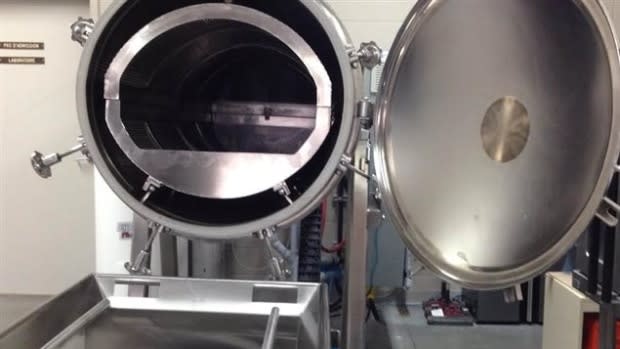Cremation not yet an option in N.W.T., but it might be soon
Cremation can't happen in the Northwest Territories right now, but residents and their loved ones who want the option may soon get it.
Until recently, cremation fell into a kind of legislative grey area. While a law paving the way for cremation in the territory passed in 2017, there were no regulations to guide the practice.
But that changed on Jan. 15, when cremation regulations finally came into force in the territory.
"It's been a long road I'm happy to see that happen and that people and families here have more options in terms of end of life options," said Frame Lake MLA Kevin O'Reilly, who brought the private member's bill that would allow for cremation.
O'Reilly's bill came at the urging of Janice McKenna, the owner of McKenna Funeral Home in Yellowknife.
At least one obstacle
She's wanted to offer her own cremation services for over a decade.
"I have this dream to develop this for the Northwest Territories," said McKenna. "It's timely and I am hoping there will be no further obstacles in my way."
But right now, there's at least one: zoning.
Yellowknife's city government needs to amend a zoning by-law to allow for cremation, which requires public hearings and three readings in council, said spokesperson Alison Harrower. The city is also preparing for a water license application related to the cremation method McKenna wants to use.
Harrower said the city can't yet provide a timeline for the by-law amendment.
Still, McKenna is hopeful she will be able to offer the service. She met with city officials on Thursday and said "it went really well."
Demand on the rise
Demand for cremation is on the rise, said McKenna. She handles about 100 deaths a year and estimates that cremation is requested for a little under half of those.
"When you talk about coming to a funeral home, and you have to make a decision of your final disposition of the body, it's a very emotional topic," said McKenna. She added there are many reasons why people may choose cremation.
Some families may find keeping the ashes with them comforting, she said. Others may not want to take up land space that could be used for something else.
When you talk about coming to a funeral home, and you have to make a decision of your final disposition of the body, it's a very emotional topic. - Janice McKenna, owner of McKenna Funeral Home
McKenna suspects that if cremation is offered in Yellowknife, demand for the service will grow further.
In the meantime, McKenna makes arrangements for the service to be done in Edmonton. The whole process takes about a week.
McKenna said she's secured deals with a company there, and with airline Canadian North — discounts she said she passes on to her customers — but the whole package still comes out to around $5,000.
"Costs of a funeral are exorbitant," said McKenna. "I feel badly for that."
She says if she could offer cremation in Yellowknife, it would cut those costs down substantially.
Aquamation
McKenna hopes to perform her cremations using a process called alkaline hydrolysis — also known as aquamation.
Instead of burning, aquamation reduces a body to ash using a potassium hydroxide and water solution. She said the process takes about 12 hours.
Aquamation is viewed as an environmentally-friendly alternative to incineration, said McKenna, and "the outcome is the same."

"As a watered system, you can have [the machine] on my site here," she said, adding that there would be "no effect to my neighborhood."
It isn't just people in Yellowknife, though, who McKenna expects would use her cremation service. She's arranged cremations for residents of Fort Simpson, Norman Wells, Hay River, Fort Resolution and Cambridge Bay, Nunavut.
"There's people all over who want to have cremation," she said, "and the business should stay in the North."

